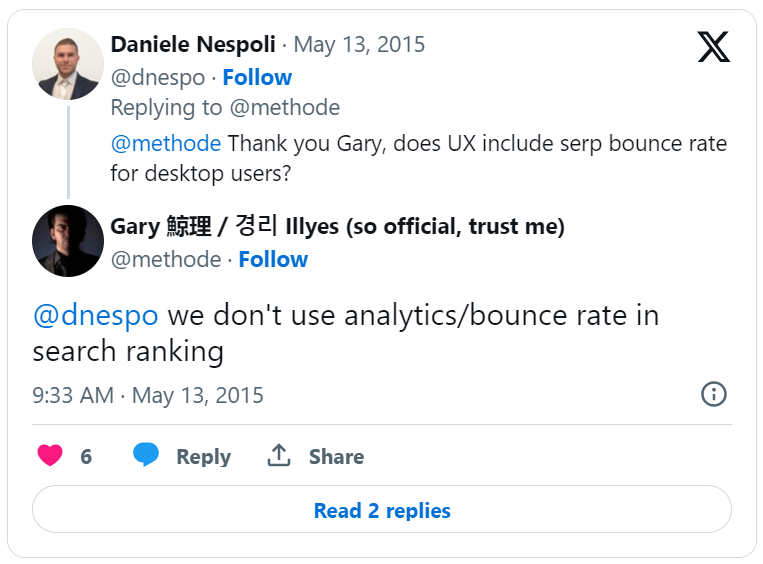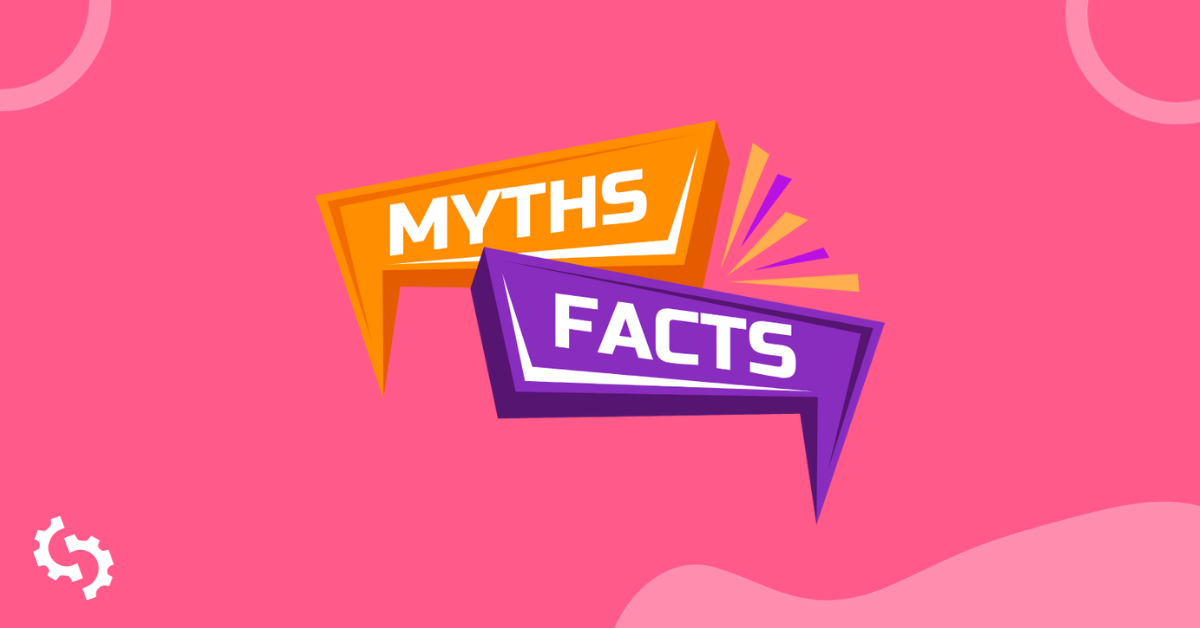
SEO is one of the most important types of digital marketing and many businesses rely on this medium to generate traffic and leads, it's essential to separate fact from fiction when it comes to search engine optimization.
With so much information and advice circulating about SEO strategies, it can be challenging to determine what will truly help your website succeed.
In this article, we will debunk 16 popular SEO myths that you should steer clear of this year and beyond. We've also asked some leading digital agency founders and SEO experts on what myths they think are the most prevalent in the industry.
Agency Founders and Marketers Featured in This Article
We'd like to thank the following marketers and digital agency founders for their feedback and contributions to this article:
- Tom Desmond, Marketing Manager @ Uppercut SEO, United States
- Paul Posea, Marketing Specialist @ Superside, United States
- Marcello Cardoso, CEO & Founder @ Cabana Digital, Brazil
- Viktoria Medvedko, Founder @ GetMentioned, Poland
- Dave Wilkenson, SEO & Digital Marketer @ Splendjet, United States
- Adam Hardingham, SEO Consultant @ Rivmedia, United Kingdom
- George Bates, SEO Manager @ Limelight Digital, United Kingdom
- David Nunez, SEO Specialist @ Grove Brands, United States
- Michael Giannulis, CEO @ Lead Engine Labs, United States
- Katie Stone, SEO Lead @ Leadhub, United States
- Michael O’Grady, SEO Consultant & Owner @ Verdict Digital Marketing, United States
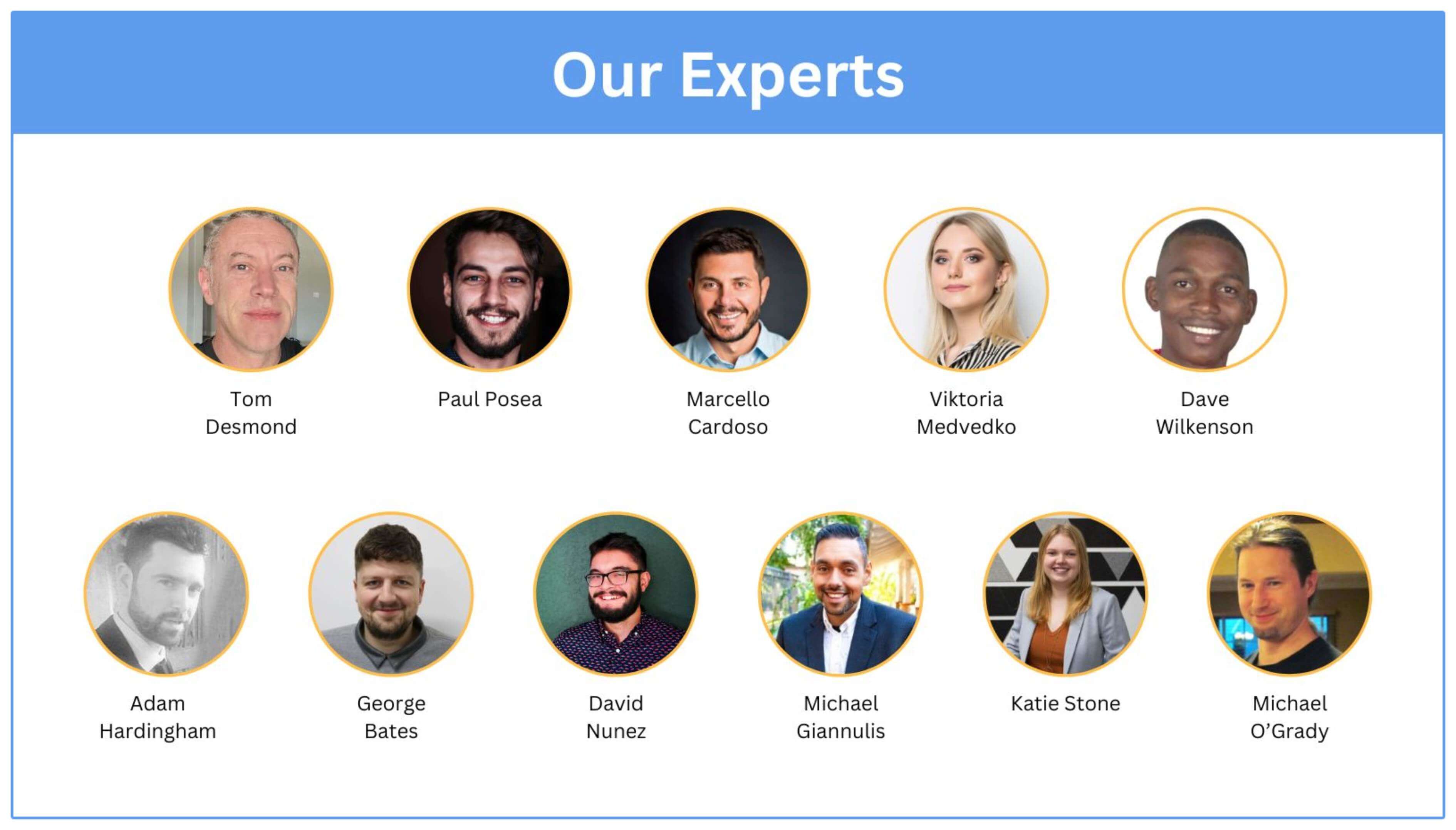
Why Do SEO Myths Exist?
Have you ever wondered why these myths exist in the first place? Let's delve into a few reasons behind the prevalence of SEO myths:
Complexity of SEO
Search Engine Optimization is a multifaceted discipline that encompasses various technicalities and ever-changing algorithms. The intricacies involved can make it challenging for individuals to fully understand the ins and outs of SEO.
"Some people think SEO is just like jotting down a few keywords, buying some backlinks, and that is all."
- Dave Wilkenson, Splendjet
This knowledge gap creates fertile ground for misconceptions and misunderstandings to take root.
Lack of Updated Information
SEO practices evolve rapidly, with search engines continuously refining their algorithms. For instance, check all of the changes Google made to its search engine algorithm during 2022 and 2023:
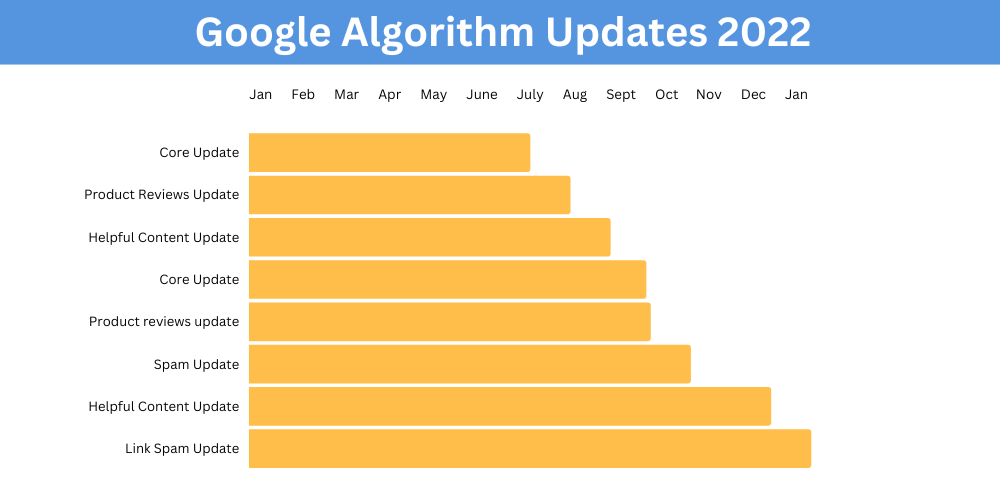
What may have been true in the past may no longer hold weight today. Unfortunately, outdated information or strategies that once worked can perpetuate as myths, leading to confusion among website owners and marketers.
Overgeneralization and Oversimplification
SEO is not a one-size-fits-all solution. Each website has unique characteristics, target audiences, and goals. However, some SEO myths arise from overgeneralizing or oversimplifying certain principles, assuming that what works for one website will guarantee success for all.
This oversimplification can lead to misguided advice and perpetuation of myths.
Misinterpretation and Miscommunication
SEO-related concepts can be complex, and misinterpretation of information is not uncommon. As ideas are passed on through various sources, miscommunication can occur, leading to the distortion of facts and the birth of SEO myths.
SEO Myth 1: SEO is a One Time Thing
One prevalent myth that persists is the notion that SEO is a one-time task. However, the reality is quite the opposite.
As Paul Posea, outreach specialist at Superside, a design agency based in Delaware, puts it:
"Search engine optimization is a process that never ends."
To stay at the forefront of search engine rankings, businesses must continually adapt to algorithm changes and optimize their websites accordingly.
Furthermore, with millions of websites vying for visibility and traffic, competition in the online space is fierce.
To stand out from the crowd and capture the attention of their target audience, businesses must consistently refine and improve their SEO efforts. This involves monitoring keyword trends, analyzing competitors' strategies, and staying up-to-date with industry developments.
Evolving user behavior and trends also mean that you need to adapt your approach to SEO every now and then. The keywords and phrases potential customers use to find products or services may change over time.
Regularly researching and incorporating these evolving search terms into your SEO strategy ensures you remain relevant and visible to your target audience.
SEO Myth 2: Longer Content is Better
There's a widespread misconception that longer content automatically ranks higher and performs better. However, the truth is that content length alone is not a decisive ranking factor.
"Making sure you reach a word count of 750 or 1000 is not where your priorities should lie."
- David Nunez, Grove Brands
While producing comprehensive and in-depth content can be valuable, it's important to prioritize quality over number of words. Remember, Google's main mission is to organize the world's information by delivering the most relevant and useful content to users.
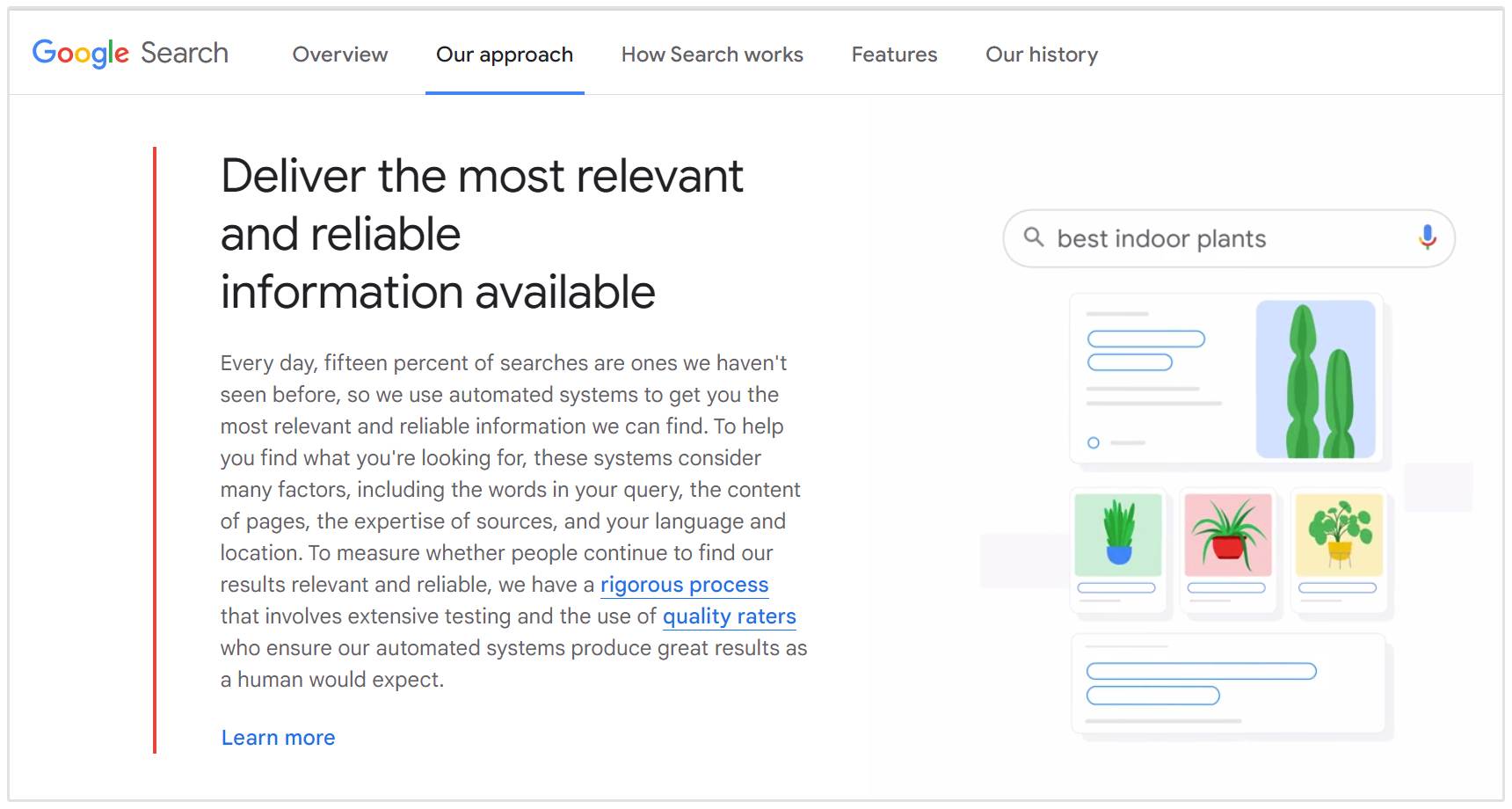
This means that content should provide value, answer user queries, and engage readers. Irrespective of length, content that is well-written, informative, and engaging tends to perform better.
SEO Myth 3: H1 Tags Impact SEO

One common myth that persists is the belief that H1 tags have a significant impact on search engine optimization. However, this myth is just simply no longer true.
Contrary to popular belief, H1 tags no longer have the same impact on search engine optimization as they once did.
While H1 tags used to be hailed as a crucial ranking factor, the truth is that their influence has diminished over time.
The emphasis now lies on other essential aspects, such as writing quality content, optimizing website structure, building backlinks, and ensuring an exceptional user experience.
Numerous industry experts, including John Mueller, have dispelled the notion that H1 tags play a significant role in SEO rankings. In fact, there is limited evidence to support the idea that keywords within H1 tags directly impact your position in search results.
“You can use H1 tags as often as you want on a page. There’s no limit, neither upper or lower bound. Your site is going to rank perfectly fine with no H1 tags or with five H1 tags.”
- John Mueller
SEO Myth 4: The More Keywords You Use, The Higher Your Rankings
"I believe one of the most dangerous SEO myths is the overemphasis on keyword density."
- George Bates, Limelight Digital
With Google's shift from a solely keyword-focused approach to a more sophisticated semantic search approach, this SEO myth has been properly debunked.
Semantic search aims to understand the user's intent and the context behind their search queries, allowing search engines to deliver more accurate and relevant results. It considers factors beyond mere keyword matching and incorporates elements such as natural language processing, machine learning, and understanding your website.
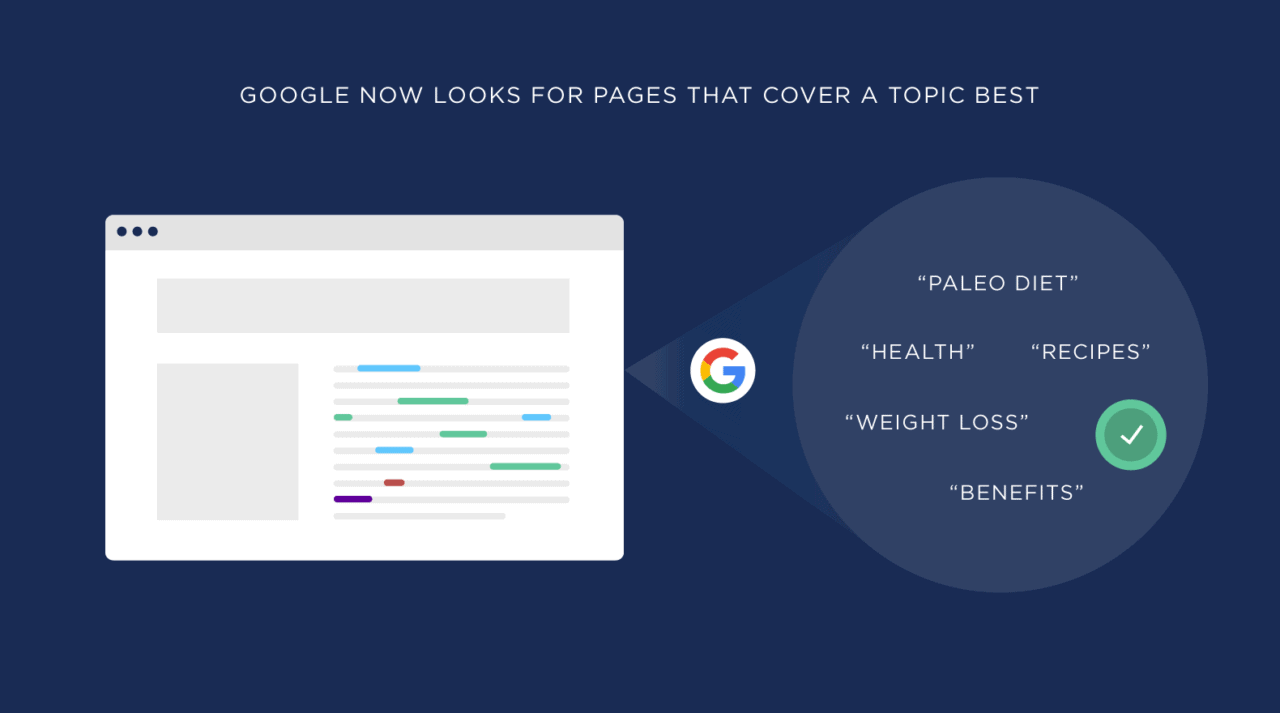
Google now prioritizes the overall site experience, topical relevance, and the quality of content.
Google's algorithm now assesses the relevance and depth of content by analyzing various signals such as user engagement metrics, backlinks, social shares, and the overall topical relevance of the website. This shift reflects Google's goal of delivering the best user experience and ensuring that searchers find exactly what they're looking for.
"SEO is not a keyword numbers game."
- Michael Giannulis, Lead Engine Labs
SEO Myth 5: Bounce Rate is a Google Ranking Factor
The belief that bounce rate directly impacts Google rankings is another SEO myth that should be debunked.
While bounce rate itself is not a direct ranking factor, it holds valuable insights into the quality and relevance of your content.
High bounce rates may indicate that visitors did not find what they were looking for, it doesn't necessarily mean your site will be penalized by Google. Instead, this metric can provide a valuable indication of whether or not your content satisfies the user's search intent.
Monitoring bounce rates can help identify areas of improvement in terms of content relevance, user experience, and overall site effectiveness.
SEO Myth 6: Google Doesn’t Consider Social Media Signals
Contrary to this misconception, social media does play a role in influencing search engine optimization.
Yes, social media signals, such as likes, shares, or followers, may not be direct ranking factors in Google's algorithm.
However, social media can amplify the visibility and reach of your content. When your blog posts, videos, or other web pages are shared and liked by users on social media, it increases the chances of more people discovering and engaging with your content.
Adam Hardingham, CEO of Rivmedia, a digital agency based in the United Kingdom agrees that while social media doens't have a direct impact on SEO, it's still useful in for ganing potential new links.
"An active social media presence can indirectly improve your SEO by boosting brand authority and generating backlinks."
By strategically sharing links to your web pages, blog posts, or product pages on social media, you can generate referral traffic and increase the overall visibility of your site. The more traffic and engagement your website receives from social media, the more Google perceives it as valuable and relevant.
SEO Myth 7: SEO is Only About On-Page Optimizations
Let's debunk another common myth: the belief that SEO is solely focused on on-page optimizations.
Katie Stone, SEO Lead at Leadhub, a digital agency based in Texas, says that one of the biggest SEO myths she hears is that backlinks are dead.
"Every SEO professional should have an off-page strategy focusing on acquiring high-quality and relevant backlinks."
- Katie Stone
While on-page factors like meta tags, keyword optimization, and content quality are crucial, off-page SEO elements, particularly backlinks, play a vital role in achieving higher search engine rankings.
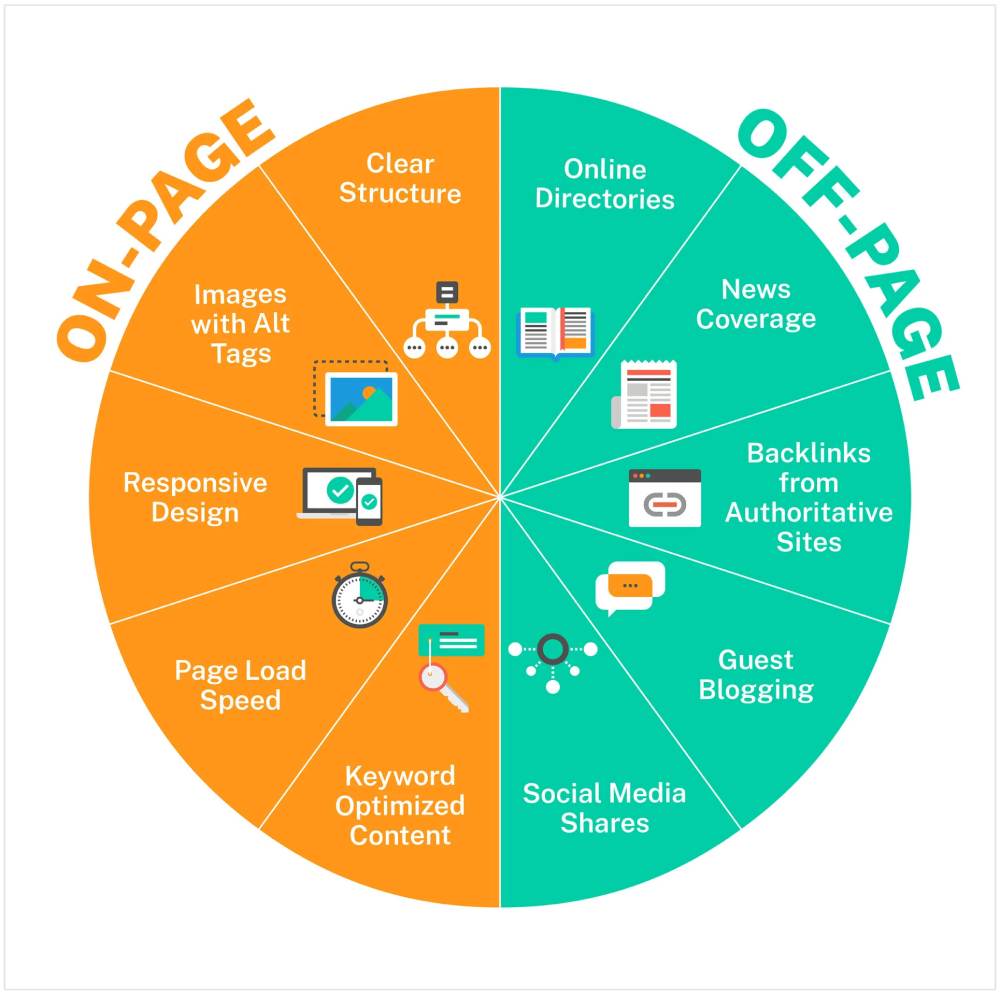
The importance of backlinks lies in their ability to improve your website's visibility, organic traffic, and search engine rankings. When authoritative websites link to your content, search engines perceive your site as more relevant and trustworthy within its niche. This can result in higher rankings for your target keywords.
SEO Myth 8: Google Penalizes Duplicate Content
Google doesn't impose penalties for duplicate content. While duplicate content doesn't lead to direct penalties, it can affect your website's performance in search results.
When multiple pages have identical or substantially similar content, search engines might struggle to determine which version to rank, potentially diluting the visibility of your desired page.
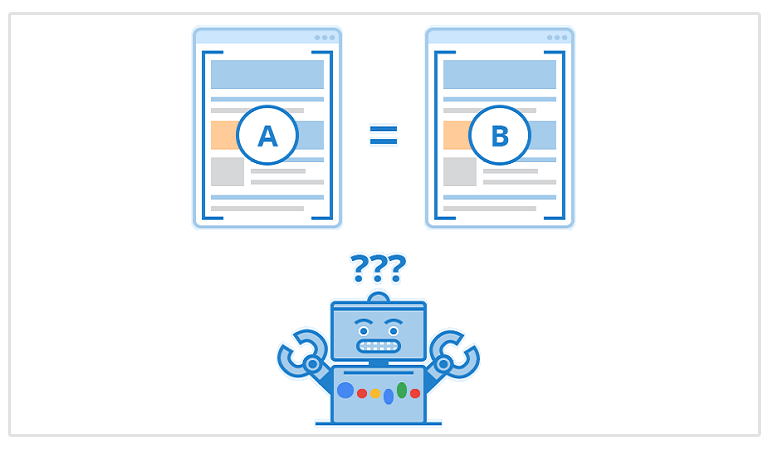
Image source: Explore Insiders
To mitigate any negative impact, it's essential to properly manage duplicate content. Use canonical tags to indicate the preferred version of a page to search engines. Implementing redirects, such as 301 redirects, can also consolidate duplicate content and consolidate its ranking potential.
SEO Myth 9: Optimizing for Specific Keywords is No Longer Useful
There is a prevailing myth that optimizing for specific keywords is no longer useful.
While it's true that Google has shifted towards a more context-driven approach, focusing on user intent and semantic search, keyword optimization remains a crucial aspect of a comprehensive SEO strategy.
Optimizing various elements of your page for specific keywords helps search engines understand the relevance of your content to users' queries. Here are key areas where keyword optimization continues to be important:
- Page Title
- Header Tags
- URLs
- Image Alt Tags
- Meta Descriptions
- Content Body
By optimizing these elements for specific keywords, you can better align your content with user intent and improve its visibility in search results, leading to increased organic traffic and higher rankings.
SEO Myth 10: Having a Sitemap Increases Rankings & Traffic
Sitemaps are an important tool for search engines to discover and index your web pages, they do not directly impact rankings or drive substantial organic traffic on their own.
A sitemap ensures that search engines can access and understand your web pages, allowing them to appear in search results.
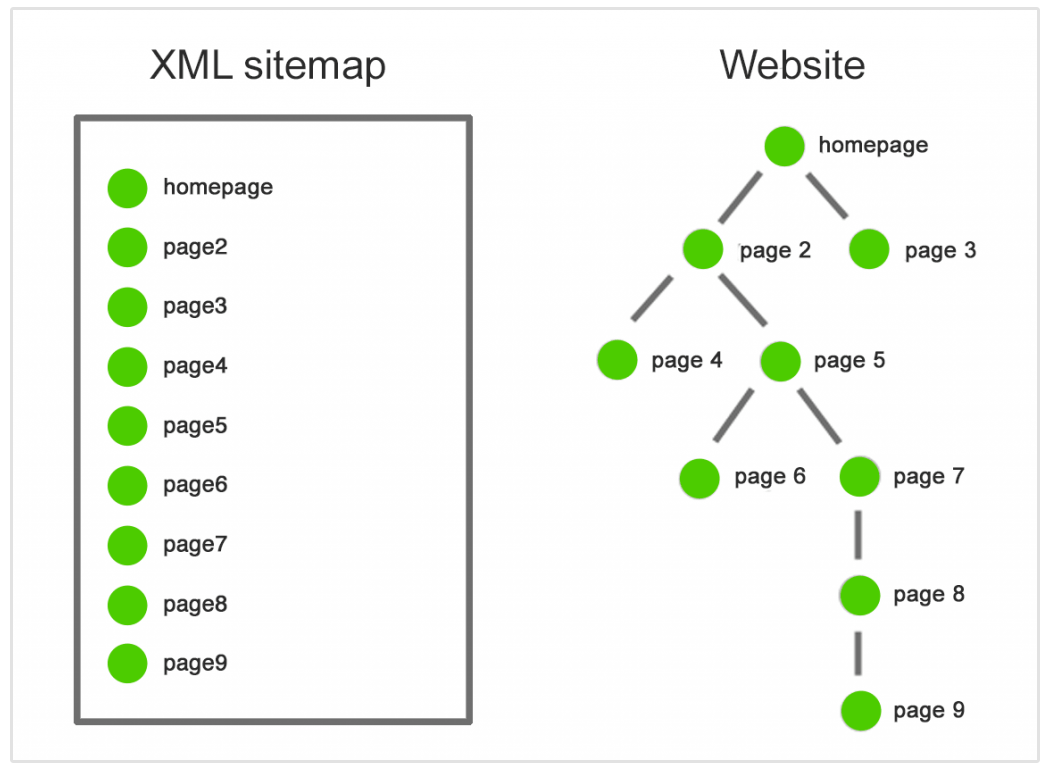
While a sitemap helps search engines find and crawl your pages, it does not guarantee higher rankings or increased organic traffic if your content lacks substance, relevance, or quality.
SEO Myth 11: All Backlinks are Good
Not all links are created equal, and the quality and relevance of your backlink profile play a significant role in your SEO success.
"Backlinks remain influential, but the more links, the better mentality is perilous."
- Tom Desmond, Uppercut SEO
High-quality backlinks from reputable and authoritative websites can positively impact your search engine rankings. Conversely, low-quality or toxic backlinks can harm your website's visibility and reputation.
To ensure a healthy backlink profile, consider the following practices:
- Focus on Link Quality over Quantity: Emphasize acquiring high-quality backlinks from authoritative and relevant websites within your industry. Target websites with strong domain authority, good reputation, and engaged audiences.
- Perform Regular Backlink Audits: Assess your existing backlink profile to identify any toxic or low-quality links. You can use tools like SEOptimer to analyze link quality with our Backlink Checker tool and disavow harmful links that may be impacting your site's performance.
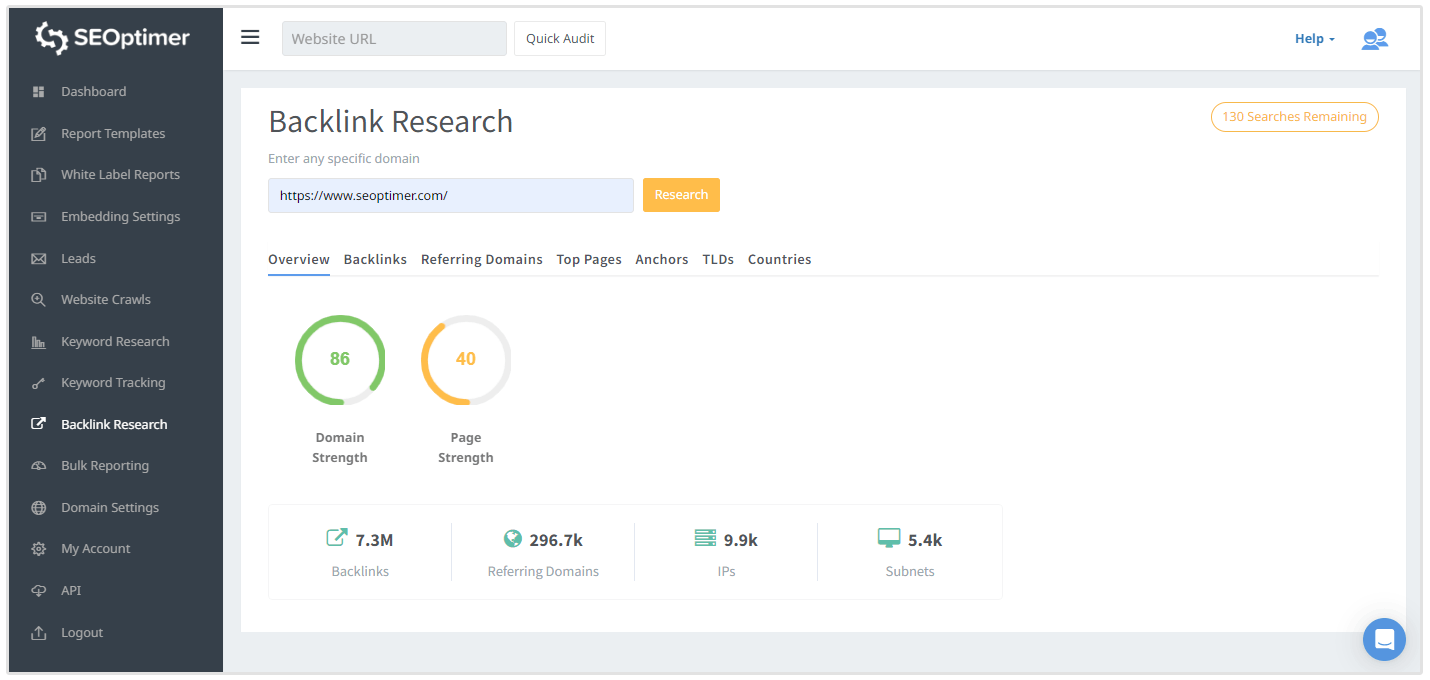
- Earn Natural Backlinks: Instead of resorting to manipulative tactics, focus on creating valuable content that naturally attracts backlinks from reputable sources.
- Monitor and Disavow Toxic Links: Regularly monitor your backlink profile for suspicious or toxic links.
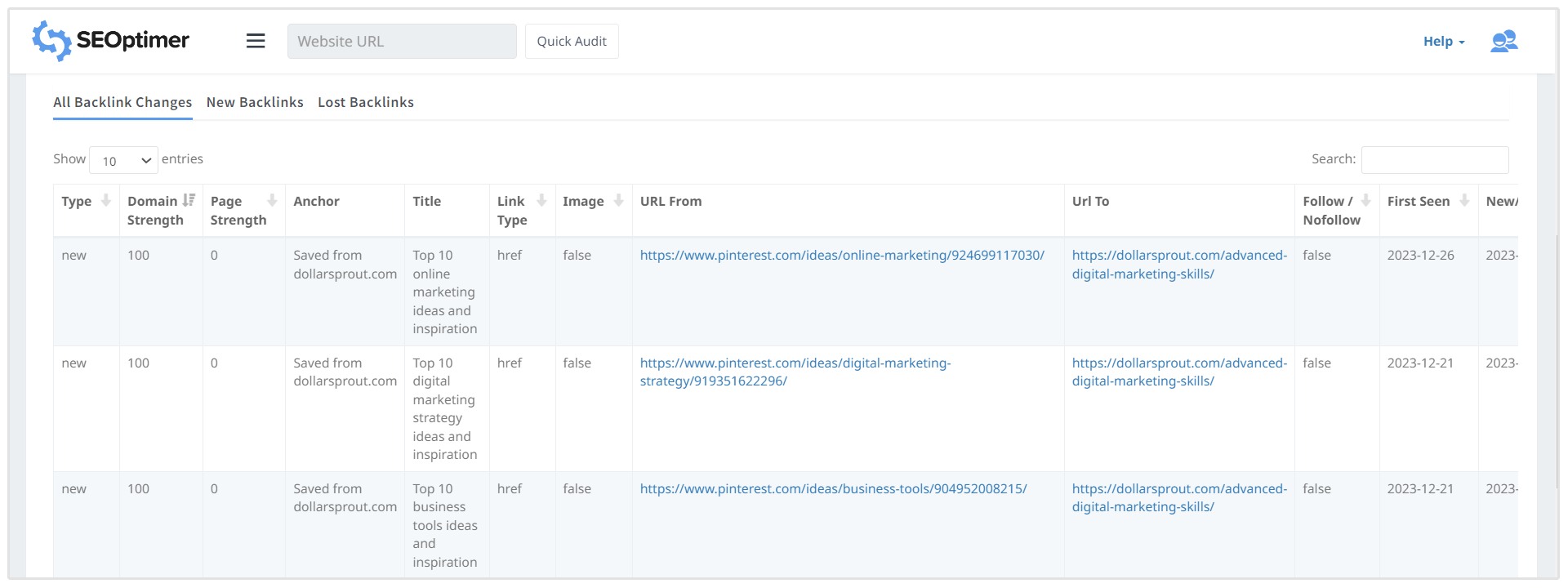
- Diversify Your Link Profile: Aim for a diverse range of backlinks from various sources, including guest posts, interviews, industry directories, social media shares, and collaborations. A well-rounded and natural link profile helps establish your authority and relevance.
"A handful of high-quality links from trusted, authoritative sites outweigh hundreds of low-quality links from less credible sources."
- Marcello Cardoso, Cabana Digital
SEO Myth 12: Guest Blogging is a Waste of Time & Resources
It's important to recognize that while guest blogging can have drawbacks if approached in the wrong manner, however, it can also offer valuable benefits when done strategically.
The Wrong Way to Go About Guest Blogging
- Lack of Relevance: If you indiscriminately contribute guest posts to unrelated or low-quality websites, it can be a waste of time since the audience may not align with your target market. Relevance is key when selecting guest blogging opportunities.
- Poorly Written Content: Publishing poorly written or low-quality content on external platforms can have negative repercussions. It can damage your brand's reputation and fail to provide value to readers, making it a waste of time and resources.
- Limited Reach: Guest blogging on sites with a small or inactive audience may not yield significant results. Low traffic and limited visibility can make it challenging to generate meaningful engagement or drive substantial traffic to your own website.
The Right Way to Go About Guest Blogging
- Expanded Reach and Audience: One of the major advantages of guest blogging is the opportunity to tap into a new audience. By contributing high-quality content to reputable websites in your niche, you can reach a wider audience and increase brand exposure.
- Enhanced Brand Authority and Credibility: Guest blogging on authoritative platforms helps establish your expertise and credibility within your industry. By providing valuable insights and demonstrating thought leadership, you can boost your brand's reputation and authority.
- Quality Backlinks: Guest blogging often includes the opportunity to include links back to your own website. These backlinks from reputable sources can enhance your website's SEO, drive referral traffic, and positively impact search engine rankings.
- Networking Opportunities: Guest blogging opens doors to networking with industry influencers, experts, and other content creators. This can lead to valuable collaborations, partnerships, and increased visibility within your industry.
SEO Myth 13: PPC Marketing Helps SEO
PPC and SEO are both essential components of a comprehensive digital marketing strategy, but it's important to understand that PPC does not directly impact organic search rankings.
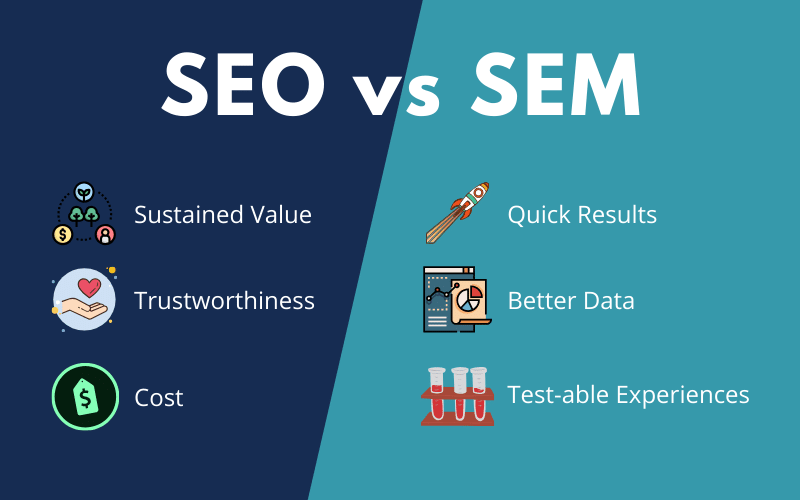
Image source: Seotopia
While PPC and SEO may coexist within a broader digital marketing strategy, it's crucial to recognize that they operate independently of each other. Here's why PPC marketing does not directly impact SEO:
- Paid vs. Organic: PPC ads appear separately from organic search results. Google and other search engines treat paid ads and organic listings as separate entities, ensuring that paid advertising does not influence organic rankings.
- Algorithmic Rankings: Organic search rankings are determined by complex algorithms that consider various factors. These algorithms prioritize organic search results based on their perceived value to users, rather than ad spend.
- Immediate vs. Long-Term Results: PPC campaigns can generate immediate traffic and visibility, as ads are displayed as soon as the campaign is launched. In contrast, SEO is a long-term strategy that requires ongoing optimization and time to build authority and improve organic rankings.
While PPC marketing may not directly impact SEO, it can offer indirect benefits and synergies that contribute to overall digital marketing success.
For instance, PPC campaigns provide valuable data on keyword performance, search volume, and user behavior. This information can inform your SEO strategy, helping you identify high-converting keywords and optimize your organic content accordingly.
SEO Myth 14: Claiming Your GMB Listing will Increase Local Rankings
This next SEO myth is important for local business owners and marketers to understand. While it is crucial to have an optimized GMB listing for local businesses, it's important to understand that claiming your GMB listing is just one piece of the puzzle when it comes to improving local rankings.
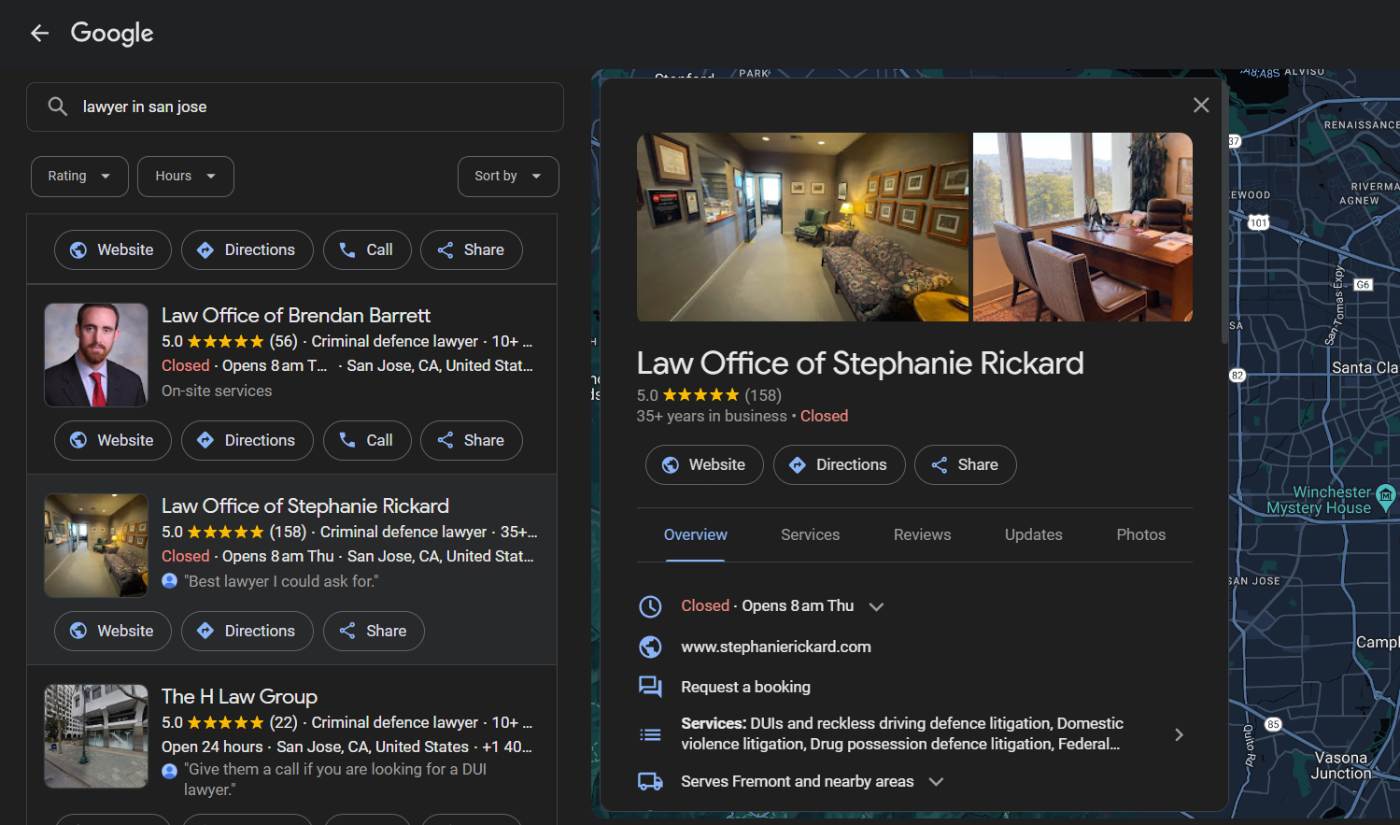
Claiming your GMB listing does play a role in local SEO strategy. By claiming your GMB profile, you have the ability to edit and add information about your business, this includes:
- Adding a business description
- Adding photos and videos of your business
- Creating and publishing Google Posts
- Editing business operating hours
- Adding Products and Services to your Business Profile
- Responding to Google Reviews
By claiming your Business profile, you can optimize your GMB listing with relevant keywords, compelling descriptions, high-quality photos, and positive customer reviews which contributes to overall local SEO success.
SEO Myth 15: You Don’t Need to Update Content
Michael O’Grady, SEO Consultant and Owner of Verdict Digital Marketing believes that one popular SEO myth that needs to be debunked is the belief that once you create and publish content, you can simply leave it untouched without any updates.
In reality, regular content updates are crucial for maintaining a strong online presence and maximizing the effectiveness of your SEO efforts.
"Many business owners think they have the all the content they need, but don’t understand Google prefers websites that post new content often."
- Michael O'Grady
Outdated or irrelevant content can lead to a poor user experience and potentially deter users from engaging with your website. By regularly updating your content, you can provide users with the most recent and relevant information, enhancing their experience and encouraging them to stay longer on your site.
SEO Myth 16: SEO Offers Immediate Results
Viktoria Medvedko, Founder of link-building agency, GetMentioned, mentions that another common SEO myth that many people fall for is that SEO offers immediate results.
"Expecting immediate results from SEO efforts is unrealistic; SEO is a long-term strategy that requires patience and consistent effort."
Given the continuous effort and expertise required to navigate the complexities of SEO, many business owners opt to hire a digital agency.
These agencies possess the knowledge, experience, and resources to execute effective SEO strategies on an ongoing basis. By leveraging their expertise, businesses can focus on their core operations while benefiting from the agency's commitment to staying abreast of industry trends and evolving SEO practices.
Conclusion
By understanding the truth behind these common misconceptions and SEO myths, we can make informed decisions that positively impact our SEO strategies.
Did we miss anything? Tweet to us @seoptimer.





